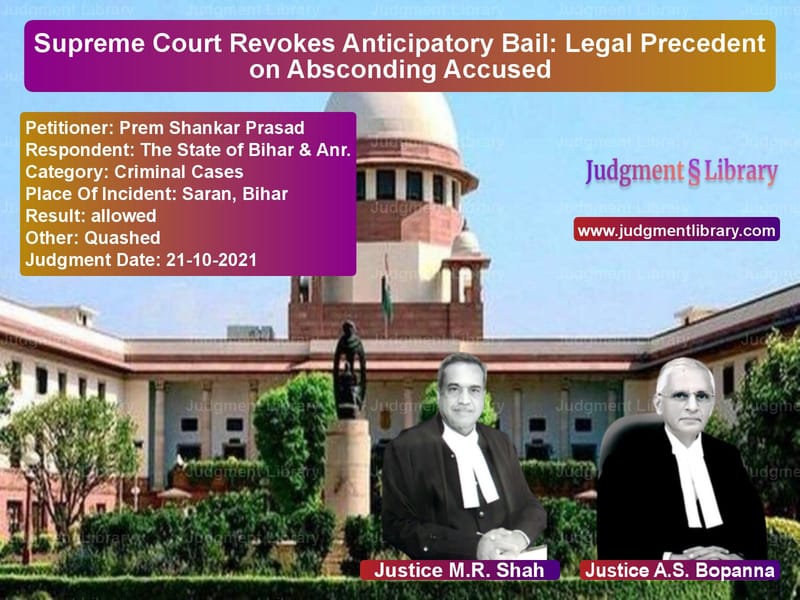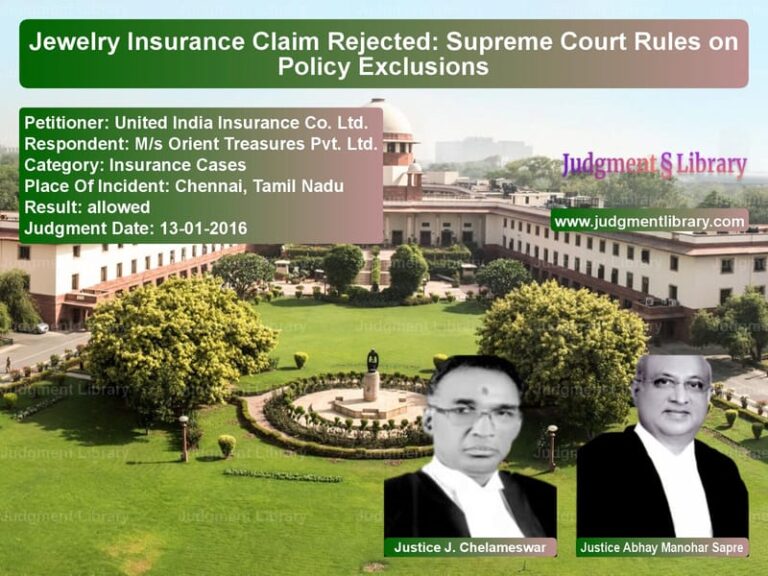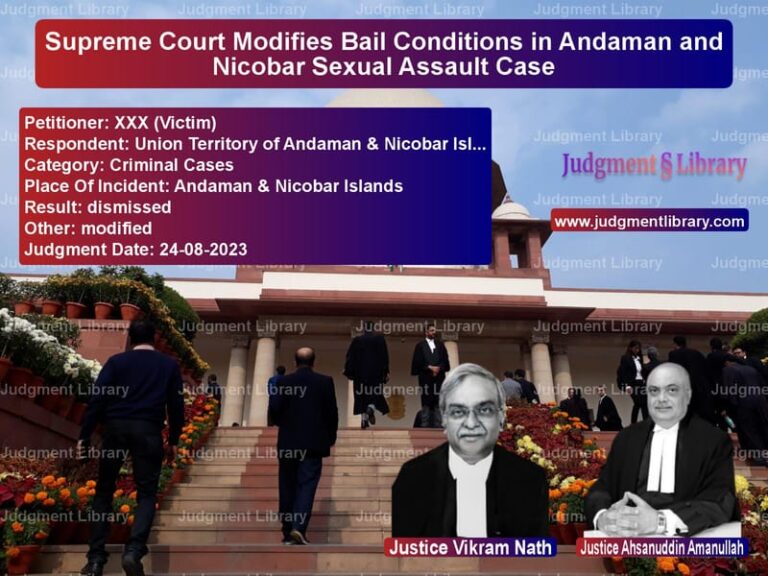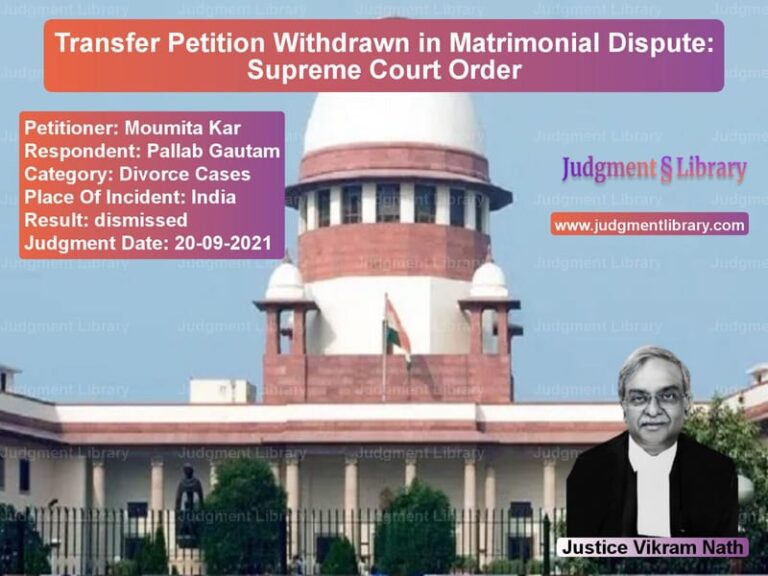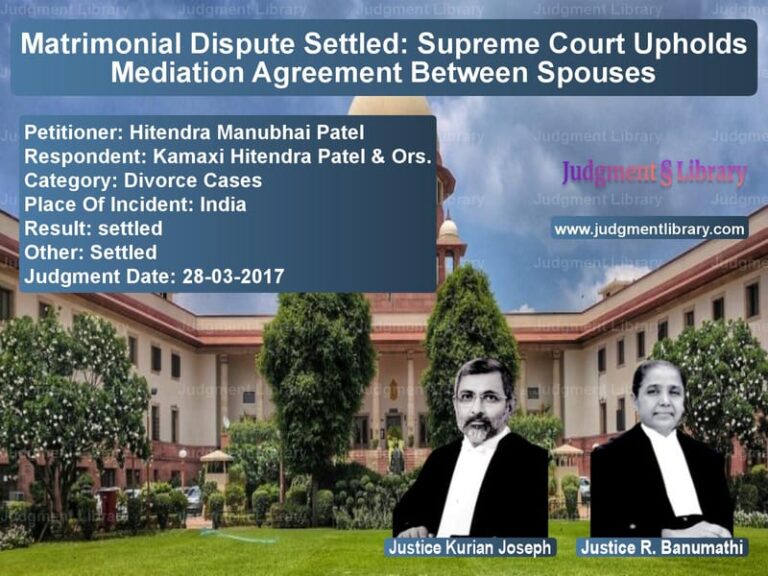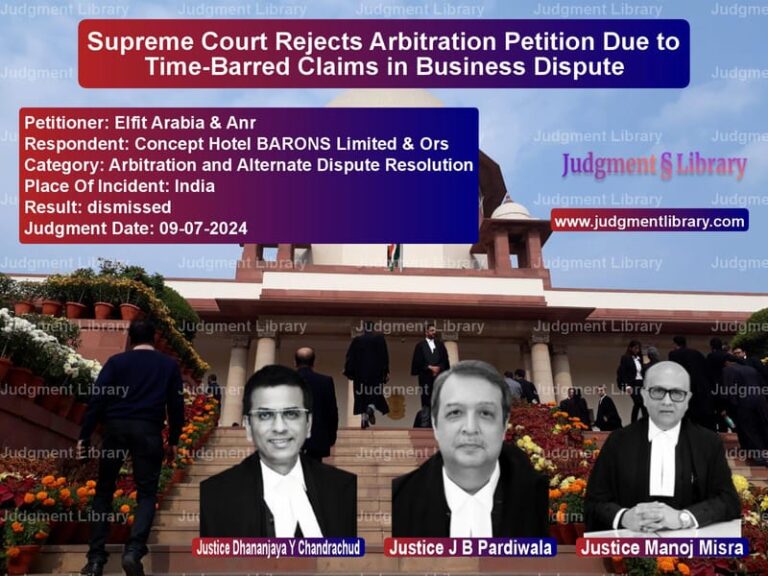Supreme Court Revokes Anticipatory Bail: Legal Precedent on Absconding Accused
The Supreme Court of India, in the case of Prem Shankar Prasad v. The State of Bihar & Anr. (Criminal Appeal No. 1209 of 2021), addressed a significant legal issue related to anticipatory bail for absconding accused persons. This case arose from an appeal challenging the Patna High Court’s decision to grant anticipatory bail to an accused despite pending proceedings under Sections 82-83 of the Criminal Procedure Code (CrPC). The Supreme Court, through its judgment on October 21, 2021, delivered by M.R. Shah and A.S. Bopanna, revoked the bail, reaffirming that absconders cannot claim anticipatory bail as a right.
The ruling is a crucial precedent that reinforces judicial scrutiny in cases involving serious criminal offenses, especially when an accused evades arrest and is declared a proclaimed offender.
Background of the Case
The case originated from an FIR filed at Chapra Town Police Station, Saran, under Case No. 453 of 2018, for offenses punishable under Sections 406, 407, 468, and 506 IPC. The complaint alleged that the accused had engaged in fraudulent activities, including criminal breach of trust and cheating. Due to his non-cooperation with the investigation, the trial court issued an arrest warrant on December 19, 2018. However, the accused went into hiding, leading to the issuance of a proclamation under Section 82 CrPC.
Petitioner’s Arguments
The petitioner, represented by Rituraj Biswas, contended that:
- The accused had been evading arrest and was declared an absconder.
- The trial court had already denied anticipatory bail on merits.
- The High Court ignored the fact that proceedings under Sections 82-83 of CrPC had been initiated against the accused.
- The accused was facing serious charges under Sections 406 and 420 IPC, which pertained to criminal breach of trust and cheating.
- There was a prima facie case against the accused, as established by the charge sheet.
- Granting anticipatory bail in such cases would set a dangerous precedent.
Respondent’s Arguments
The defense, represented by Abhishek, argued that:
- The case arose out of a business transaction, making the offense less severe.
- The accused was not absconding and was available for interrogation.
- The charges should have been considered under Section 138 of the Negotiable Instruments Act, 1881, rather than Sections 406 and 420 IPC.
- Even though a charge sheet had been filed, the trial court had yet to take cognizance.
Supreme Court’s Judgment
The Supreme Court, after examining the case details, overruled the High Court’s decision and ruled against anticipatory bail. The key findings included:
- The accused had evaded arrest and was declared an absconder.
- The trial court had rightly denied anticipatory bail based on the gravity of the offense.
- The High Court ignored the initiation of proceedings under Sections 82-83 CrPC.
- Business transactions could also involve criminal offenses such as cheating and criminal breach of trust.
Key Extract from the Judgment:
“It is clear from the above decision that if anyone is declared as an absconder/proclaimed offender in terms of Section 82 of the Code, he is not entitled to the relief of anticipatory bail.”
Legal Analysis
The ruling underscores the Supreme Court’s stance on anticipatory bail for accused individuals who evade arrest. In previous cases, such as State of Madhya Pradesh v. Pradeep Sharma (2014), the Court had ruled that absconding accused persons are not entitled to anticipatory bail. The Court reiterated this principle in the present case, emphasizing that:
- Anticipatory bail is an extraordinary remedy and should not be misused by individuals trying to evade the law.
- The trial court’s denial of anticipatory bail should have been given due weight by the High Court.
- Allowing anticipatory bail in such cases weakens law enforcement mechanisms.
Final Verdict
- The Supreme Court set aside the High Court’s order dated August 14, 2019.
- The anticipatory bail granted to Respondent No. 2 was revoked.
- The accused was given two weeks to surrender before the trial court.
- The accused could apply for regular bail, which would be decided on merits.
This ruling emphasizes that absconding accused persons cannot be granted anticipatory bail and that trial courts’ decisions should be given due consideration when dealing with serious offenses.
Petitioner Name: Prem Shankar Prasad.Respondent Name: The State of Bihar & Anr..Judgment By: Justice M.R. Shah, Justice A.S. Bopanna.Place Of Incident: Saran, Bihar.Judgment Date: 21-10-2021.
Don’t miss out on the full details! Download the complete judgment in PDF format below and gain valuable insights instantly!
Download Judgment: prem-shankar-prasad-vs-the-state-of-bihar-&-supreme-court-of-india-judgment-dated-21-10-2021.pdf
Directly Download Judgment: Directly download this Judgment
See all petitions in Bail and Anticipatory Bail
See all petitions in Fraud and Forgery
See all petitions in Judgment by Mukeshkumar Rasikbhai Shah
See all petitions in Judgment by A. S. Bopanna
See all petitions in allowed
See all petitions in Quashed
See all petitions in supreme court of India judgments October 2021
See all petitions in 2021 judgments
See all posts in Criminal Cases Category
See all allowed petitions in Criminal Cases Category
See all Dismissed petitions in Criminal Cases Category
See all partially allowed petitions in Criminal Cases Category

